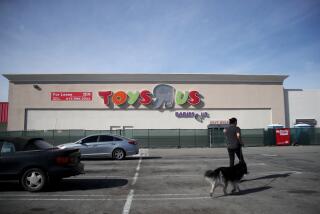What’s in a Name? Cherokee Is Finding Out
- Share via
A year ago, Cherokee Inc. was on the verge of extinction. The Van Nuys supplier of casual apparel and footwear had just squeaked through its second bankruptcy reorganization in less than two years, and was still bleeding money.
That’s when Robert Margolis, who had resigned as Cherokee’s chief executive in 1993, saw an opportunity. Together with some other investors, he snapped up 25% of Cherokee’s bargain-basement stock, took the helm of the company again and embarked on what he calls a “radical” strategy.
Margolis, who officially took control of Cherokee last May, began selling all the company’s assets and inventories, right down to the zippers and buttons. Some assets are still for sale, including the company’s former 110,000-square-foot plant in Sunland.
So far, Margolis has raised $20 million, allowing him to pay off bank debt and bills and still have $6 million left in the bank.
By the time Margolis is finished, there will be only one asset remaining: the Cherokee brand name.
His plan is simple. Cherokee will license its well-known brand name in exchange for royalties of about 3% of retail sales. But even though the licensing of brand names is a well-established practice--think Disney--Cherokee’s approach is unusual.
Cherokee is concentrating on licensing directly to retailers, rather than the more commonplace arrangement of licensing to manufacturers, who in turn sell products to retailers. Cherokee’s biggest contract so far is with Target Stores, which in the fall will begin selling Cherokee brand women’s jeans and shoes, girls’ apparel and various accessories. Cherokee has also landed contracts with Mervyn’s, specialty chains such as Modern Woman and Woman’s World and retailers in Japan and the Philippines.
The guaranteed minimums written into the licensing contracts Cherokee has signed so far would give the company at least $5.5 million in revenue in its fiscal year ending May 1997. That’s tiny compared with the $200 million in annual revenues the company pulled down in the early ‘90s. But with just 14 employees now--compared to about 500 at its peak--and overhead of less than $2 million a year, Cherokee can be very profitable, Margolis said. “It’s like a real estate investment trust,” which collects monthly rent checks. “You build a solid base.”
Margolis said he conceived the idea of licensing the Cherokee brand directly to retailers after analyzing the current marketplace. Retailers, in response to fierce competition, are increasingly turning to private labels--that is, instead of buying nationally recognized brands, they are contracting for the manufacture of their own proprietary brands. One of the most successful examples of that is the Arizona brand sold by J.C. Penney.
So, Margolis figured, why not try to persuade retailers to license a brand that’s already well known? By arranging for the manufacturing themselves, as they do with their private labels, the retailers could keep their costs down--thus allowing them to offer low prices to consumers and still enjoy a healthy profit margin.
For Target, it was an easy choice. “Most people have tried Cherokee,” said Target spokeswoman Carolyn Brookter. “You don’t have to sell them on the brand name.”
And the beauty for Cherokee, said President Patricia Warren, a former Federated executive Margolis brought on board last May, is that “we don’t have the risk that a manufacturer has. We won’t get stuck with inventory.”
The licensing strategy is “a very smart move,” said Marshall Kline, a Los Angeles-based retail buyer. “You just sit and clip coupons.”
But some observers see plenty of potential pitfalls, not the least of which is that the products won’t sell as well as expected. Plus, said Lyle Kan, an associate partner specializing in consumer products at Andersen Consulting, despite having some control over quality and design, Cherokee is effectively ceding control of its brand to the retailers.
Most companies that license their brand names also supply products themselves, Kan said. For instance, Walt Disney Co., a master at marketing its brands, creates the value in those brands through its movies and theme parks. For Cherokee, “it’s going to be difficult to sustain the overall value of the brand,” Kan said.
Richard Giss, partner in the retail services group at the accounting firm Deloitte & Touche, warned that Cherokee must take care to “protect the franchise. There’s an expectation of a quality level of merchandise associated with the Cherokee name. If you license to companies that don’t remain true to that, you lose the franchise.”
Nonetheless, Margolis is brimming with optimism and ideas. He believes that sales for existing contracts will well exceed the stated minimums, and he expects to sign up more specialty and regional retailers and foreign companies. He’d like to land a contract with a linens merchant, like Strouds, to sell Cherokee towels and sheets.
If nothing else, Margolis has achieved a notable feat in merely resuscitating Cherokee. A founder of Cherokee’s apparel division in 1981, Margolis helped turn Cherokee into a popular brand known for a casual, Western-themed look. But the debt from a 1989 leveraged buyout led to the company’s first bankruptcy filing in 1993.
Still burdened by debt, and a failed strategy to focus mostly on women’s jeans, Cherokee again filed for Chapter 11 bankruptcy reorganization in November 1994. When the company emerged from bankruptcy a year ago, Margolis said he was approached by bondholders to see if he was interested in returning.
“I never thought I’d be back at Cherokee,” he said. But he jumped at the chance. “It was a glaring opportunity.”
Eventually, Margolis envisions buying another brand name that he can exploit in the same manner. But, for now, he said. “we’re focusing on Cherokee.”
More to Read
Inside the business of entertainment
The Wide Shot brings you news, analysis and insights on everything from streaming wars to production — and what it all means for the future.
You may occasionally receive promotional content from the Los Angeles Times.











